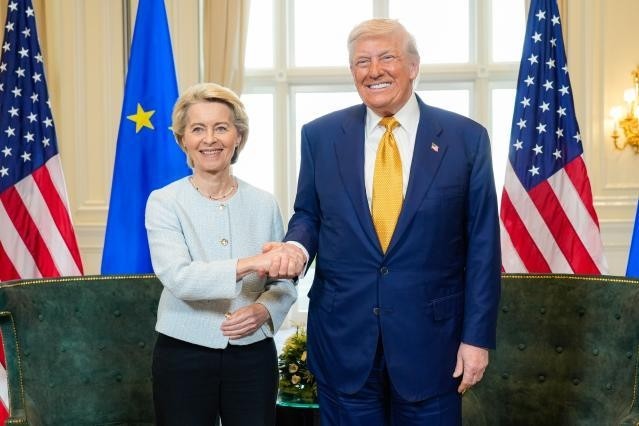Co-op leaders in Europe have struck a critical note over the trade deal agreed between the EU and USA on 27 July, after months of negotiations.
The deal means the US will apply a 15% tariff on EU goods, lower than the 30% threatened by US president Donald Trump, and European Commission president Ursula von der Leyen said the change “gives much-needed clarity for our citizens and businesses”.
But co-op leaders have warned the agreement would see a transfer of wealth to the US and exposes structural weaknesses in the EU.
The Commission says the deal includes zero-for-zero tariffs on a number of products, including all aircraft and component parts, certain chemicals, certain generics, semiconductor equipment, certain agricultural products, natural resources and critical raw materials.
Meanwhile, steel and aluminium tariffs applied to EU goods will be cut and a quota system will be put in place while EU will also purchase US energy products as part of a move to diversify sources of supply.
“We will replace Russian gas and oil with significant purchases of US LNG, oil and nuclear fuels,” said von der Leyen.
Related: Co-ops take critical line on EU budget plans
“With this deal, we are creating more predictability for our businesses. In these turbulent times, this is necessary for our companies to be able to plan and invest. We are ensuring immediate tariff relief. This will have a clear impact on the bottom lines of our companies. And with this deal, we are securing access to our largest export market.
“At the same time, we will give better access for American products in our market. This will benefit European consumers and make our businesses more competitive. This deal provides a framework from which we will further reduce tariffs on more products, address non-tariff barriers, and cooperate on economic security. Because when the EU and US work together as partners, the benefits are tangible on both sides.”
According to the US, the EU will purchase US$750bn in US energy and make new investments of $600bn in the US by 2028. But the Commission lacks the legal authority to commit the bloc to this spending target and it is up to national governments to acquire energy supplies.
REScoop.eu, the European federation of energy communities, criticised the deal.
“This is a shocking transfer of wealth to the United States,” said Daan Creupelandt, coordinator at REScoop.eu. “Instead of investing in the citizens building local transitions all over Europe, the EU and its governments renounced their values and capitulated on both climate action and energy security, threatening our resilience and social fabric.”
In an opinion piece, Giuseppe Guerini, the president of Cooperatives Europe, said that while the deal brings some clarity after months of uncertainty and tension, “it also highlights structural weaknesses within the European Union”. The deal presents new challenges for its economic fabric, including co-operatives, he added.
The 15% tariffs would affect producers, including agricultural co-operatives, he warned, adding that “these developments pose a serious challenge, especially after years of navigating successive economic crises”.
Guerini also warned of immediate financial strains as a result of the tariffs, as well as higher costs for consumers and a negative impact on the EU’s productive economy.
He called on the EU to strengthen its internal market, forge new strategic alliances, and step up as a global actor.
“This is a call to build a more resilient and competitive Europe, through a model of co-operation, not confrontation,” he wrote.
“The divisions among EU member states have left the continent vulnerable to external pressure. This must be a turning point. A stronger, more united Europe is the only way to protect the interests of its citizens and businesses.
“Cooperatives Europe supports this vision. We are committed not only to defending the single market, but also to helping build an ecosystem where cooperatives can compete, thrive, and lead innovation, contributing to a fairer, more sustainable economy.”
A joint statement is yet to be published and the US and EU say they will continue to negotiate. The deal is not legally binding and requires the unanimous approval of the European Council and ratification by the European Parliament.
